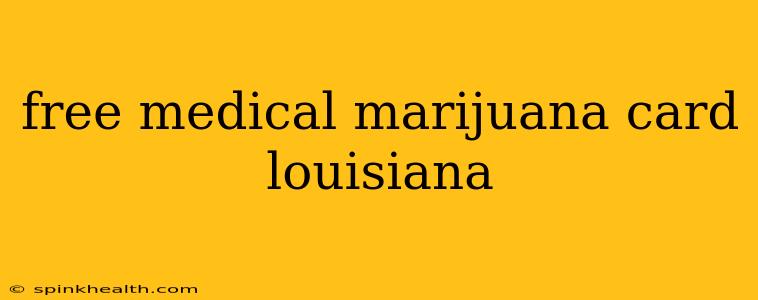Navigating the Path to a Louisiana Medical Marijuana Card: A Patient's Journey
The quest for a Louisiana medical marijuana card can feel like navigating a maze, filled with regulations, applications, and doctor visits. But don't worry, this isn't an insurmountable challenge. This guide will walk you through the process, answering common questions and offering insights to make your journey smoother.
My own experience seeking a medical marijuana card in Louisiana started with a nagging back pain that traditional treatments just couldn't alleviate. After months of frustration, I decided to explore the possibility of medical cannabis. The initial research felt overwhelming, but with persistence, I found my way. I hope this story, coupled with the answers to frequently asked questions, can help you on your path.
How can I get a medical marijuana card in Louisiana?
The first step is finding a qualified physician who is registered with the Louisiana Department of Health (LDH) to recommend medical cannabis. These physicians undergo specific training to understand the qualifying conditions and appropriately assess patients. Don't be afraid to contact several doctors; find one who understands your needs and makes you feel comfortable. The consultation will involve a thorough medical history review and examination to determine if your condition qualifies for the program. Be prepared to provide detailed information about your symptoms, treatment history, and any relevant medical records.
What conditions qualify for a medical marijuana card in Louisiana?
Louisiana's medical marijuana program covers a range of debilitating conditions. These include, but aren't limited to:
- Epilepsy or other seizure disorders: For individuals struggling with uncontrolled seizures, medical cannabis can offer a potential alternative or complement to existing treatments.
- Multiple sclerosis: The debilitating symptoms of MS can often be eased with the help of medical cannabis.
- Spasticity: This condition, often associated with neurological disorders, can find relief through the use of certain cannabis strains.
- Cancer: Patients undergoing cancer treatment may find relief from nausea, pain, and other side effects.
- HIV/AIDS: Medical marijuana can help alleviate symptoms associated with these conditions.
- Chronic pain: For those suffering from persistent, intractable pain, medical cannabis may offer a viable treatment option.
- Glaucoma: While not as common a qualifying condition, glaucoma can sometimes be treated with cannabis.
Is there an age requirement for obtaining a medical marijuana card in Louisiana?
Yes, you must be at least 18 years old to obtain a medical marijuana card in Louisiana. However, there are exceptions for individuals under 18 under very specific circumstances and with parental consent.
What is the cost of a medical marijuana card in Louisiana?
The cost varies depending on the physician's fees for the consultation and any associated administrative expenses. It is wise to inquire about these fees directly with the physician's office before scheduling an appointment. Furthermore, the LDH charges a registration fee for the medical marijuana card itself.
How long does it take to get a medical marijuana card in Louisiana?
The processing time for a medical marijuana card can fluctuate, but it generally takes several weeks after your physician submits the application to the LDH. This depends on the processing speed of the LDH and the number of applications they're handling.
What are the renewal requirements for a Louisiana medical marijuana card?
Louisiana medical marijuana cards are typically valid for one year and require renewal. The renewal process generally involves another consultation with your physician to assess the ongoing need for medical cannabis.
My experience wasn't instantaneous, but the relief I found from my back pain was undeniable. Remember, patience and persistence are key. Finding the right doctor who understands your needs is crucial. By carefully following the steps outlined, understanding the regulations, and gathering necessary documentation, you can increase your chances of a successful application. This information isn't a substitute for professional medical advice; always consult with a qualified physician before making any healthcare decisions.

